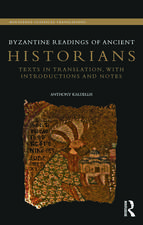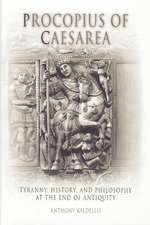Mothers and Sons, Fathers and Daughters – The Byzantine Family of Michael Psellos
Autor Michael Psellos, Anthony Kaldellisen Limba Engleză Hardback – 14 noi 2006
| Toate formatele și edițiile | Preț | Express |
|---|---|---|
| Paperback (1) | 228.63 lei 6-8 săpt. | |
| MR – University of Notre Dame Press – 14 noi 2006 | 228.63 lei 6-8 săpt. | |
| Hardback (1) | 588.36 lei 6-8 săpt. | |
| MR – University of Notre Dame Press – 14 noi 2006 | 588.36 lei 6-8 săpt. |
Preț: 588.36 lei
Preț vechi: 764.10 lei
-23% Nou
Puncte Express: 883
Preț estimativ în valută:
112.58€ • 117.54$ • 93.18£
112.58€ • 117.54$ • 93.18£
Carte tipărită la comandă
Livrare economică 04-18 aprilie
Preluare comenzi: 021 569.72.76
Specificații
ISBN-13: 9780268024154
ISBN-10: 0268024154
Pagini: 222
Dimensiuni: 152 x 229 x 16 mm
Greutate: 0.49 kg
Editura: MR – University of Notre Dame Press
ISBN-10: 0268024154
Pagini: 222
Dimensiuni: 152 x 229 x 16 mm
Greutate: 0.49 kg
Editura: MR – University of Notre Dame Press
Notă biografică
Recenzii
"This volume presents in translation all the texts that Psellos wrote concerning his family. They present the reader with the most complete picture we have of any non-imperial family by casting light on the life of Byzantine women outside the circle of hagiography and court history. The volume includes a long funeral oration for his mother, a funeral oration for his daughter Styliane, a legal work regarding the engagement of his second, adopted, daughter, a letter to his very young grandson, six letters regarding Psellos's family, and a brief work on the festival of St. Agathê. In Kaldellis's excellent translation, Michael Psellos's times and family come to life." —Comitatus, vol. 38 (2007)
“In sum, the discussion in Mothers and Sons, Fathers and Daughters is deft and crisp. The arguments are built up confidently and convincingly. Wearing his scholarship lightly, Kaldellis marshals Psellos on family to excellent effect, and offers clear and perceptive ideas.” —Journal of Hellenic Studies(128) 2008

















